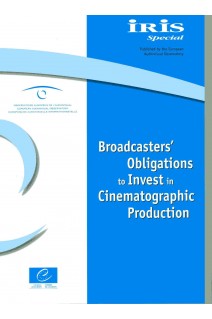This edition of IRIS Special, Broadcasters' Obligations to Invest in Cinematographic Production, focuses on the ways in which the television industry is required to support cinematographic film, and the instruments on which these obligations are based.The legal question on investment obligations is given particular emphasis because of the economic significance of the television industry's cofinancing of cinematographic film. Direct investment from broadcasters represents between 20 and 30% of film production budgets in some large European countries. In addition to this direct funding, indirect support is provided through broadcasters' contributions to the budgets of film funding bodies. Across Europe, these amount to around one-third of the budget of such bodies. The European Audiovisual Observatory has investigated some key questions relating to these broadcasters' investments (legal obligations and voluntary obligations, direct investment and indirect support, differences between obligations for public and private broadcasters, possible return, key economic figures). The key questions were put to 40 experts in the 36 member states of the European Audiovisual Observatory. Responses from 34 countries are included in this study, which shows clearly that the television industry's support of cinematographic film remains a theme that is as complex as it is topical. The main reason for this is the diversity of possible ways of arranging both simple and complex support mechanisms. The lack of common European standards means that the legal framework is constituted by national laws and varies considerably from country to country. At the heart of this study are the individual reports on 25 countries which were collected thanks to the support from the Institute of European Media Law (EMR) and the co-operation of the team of experts. A comparative legal analysis of the overall situation and a look at the economic dimension complete the picture and offer an excellent overview.




